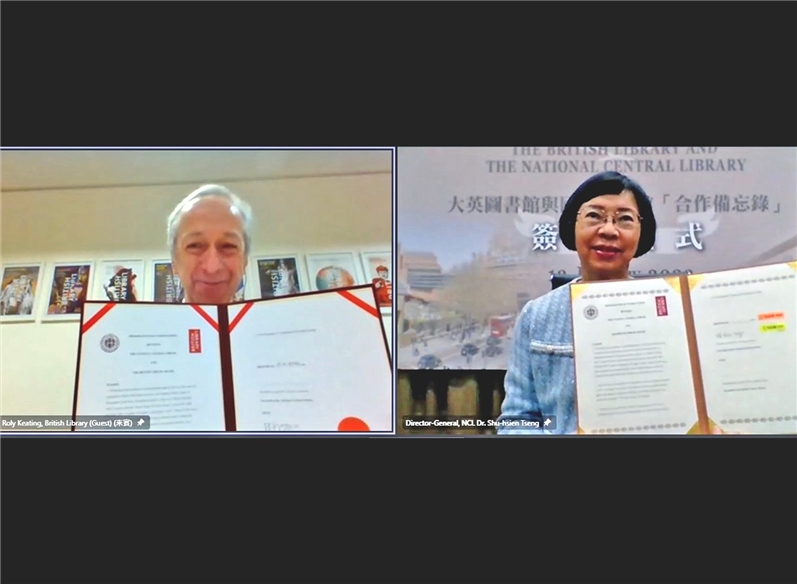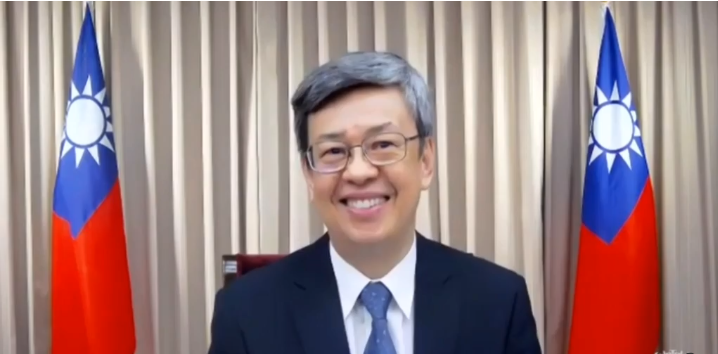 Loading...
Loading...
Co-Chairs’ Congratulatory Letter to Taiwanese President Lai Ching-te
 Loading...
Loading...
 Loading...
Loading...
 Loading...
Loading...
Taiwan, UK national libraries ink academic cooperation pact
 Tseng Shu-hsien (right), director general of Taiwan’s National Central Library, and British Library Chief Executive Roly Keating display the memorandum of understanding on academic cooperation Jan. 13 during a virtual signing ceremony. (Courtesy of NCL)
Tseng Shu-hsien (right), director general of Taiwan’s National Central Library, and British Library Chief Executive Roly Keating display the memorandum of understanding on academic cooperation Jan. 13 during a virtual signing ceremony. (Courtesy of NCL)
—–
Taiwan’s National Central Library and the British Library inked a memorandum of understanding on academic cooperation Jan. 13, spotlighting government efforts to boost bilateral cultural exchanges, according to the NCL.
Overseen by Kelly Wu-chiao Hsieh, head of Taipei Representative Office in the U.K., and British Office Taipei Rep. John Dennis, the signing was completed by NCL Director General Tseng Shu-hsien and BL Chief Executive Roly Keating. The three-year agreement lays the foundations for collaboration on issues like digitization of Chinese collections, joint research and exhibitions, and staging seminars and workshops on restoration.
Hsieh, who described the pact as a strong step forward in Taiwan-U.K. relations, said it will also play a key role in raising the country’s profile among members of the international academic community.
Echoing Hsieh’s remarks, Dennis praised the NCL’s abundant classic Chinese book collections and said he was glad that such a development was unimpeded by the pandemic.
According to Tseng, the wide-ranging agreement springboards off successful cooperation between the facilities in 2013 and 2015. It further demonstrates the value of Taiwan’s soft power as an effective way of expanding resource sharing for academics from both sides, she said.
In response, Keating said there is widespread anticipation regarding the effectiveness and potential applications of two-way projects set to take place under the pact.
Established in 1933, NCL features diverse collections of Chinese books and abundant resources for related studies. Organizational objectives include conserving important cultural assets, facilitating scholarly communication and supporting Taiwan libraries in growing global exchanges. (YCH-E)
Source: Taiwan Today
In recent years Taiwan has also been a pioneering leader in the field of green energy and as an island, much like the UK, offshore wind has been a big focus of that push. Similarly to the UK Government, the Taiwanese Government is committed to a transition to green energy.
In this paper, the British-Taiwanese APPG highlights the significant achievements that have already been delivered. But there is scope for closer cooperation in this and other sectors too and the APPG urges the British Government to do the right thing and work closer with Taiwan on these issues, starting by extending a full invite to Taiwan to participate in the COP26 Conference in Glasgow this November.
As the offshore wind space shows, closer relations between the UK and Taiwan are beneficial for both of these island nations. Furthermore, those benefits also extend to the wider world.
 Loading...
Loading...

The traditional craft of Taiwanese rush weaving is set to feature at this year’s London Craft Week 2021, with the exhibition Lines of Possibilities: Taiwanese Rush Weaving. Supported by the Ministry of Culture, Taiwan, and created in collaboration with the Taiwan Yuan-Li Handiwork Association, the exhibition will mark the fifth year Taiwan has participated at the festival. The exhibition will run from the 30th September to 10th October, giving UK audiences the chance to experience the centuries-old craft at London’s iconic gallery@oxo.

Taiwan’s particular strain of cyperus malaccensis is unique to the island. Famous for its triangular shape and firm texture, the plant provides greater variety in pattern design, giving rush-woven products a distinctive look and a higher quality. Taiwan’s indigenous Taukat people began weaving this rush plant into high quality mats to sit on during the mid-eighteenth century. Soon spreading amongst local Hakka and Minnan ethnic groups, centuries of interdependence and integration, from dynastic times to the Japanese Empire and now the modern day, have made Taiwanese rush weaving a unique multicultural craftsmanship.

Lines of Possibilities: Taiwanese Rush Weaving will be presented in a hybrid format, with the physical exhibition being accompanied by an online viewing room (https://www.linesofpossibilities.com), showing off a variety of products from the modern rush weaving industry. The online viewing room also presents a short documentary on the development of the rush weaving industry in the small town of Yuanli, Miaoli, drawing on the personal experiences of the town’s craftspeople. The exhibition will also give the British public the opportunity to learn the basics of rush weaving themselves, with interactive workshops running on the 2nd and 9th October between 14:00 and 15:00.
“The exhibition isn’t just about presenting Taiwanese craftsmanship,” noted Dr. Chen Pin-Chuan, Director of the Cultural Division at the Taipei Representative Office in the UK, “it’s about finding similarities and noting differences in Taiwanese and British culture. Both island nations have a tradition of plant weaving and basketry – so this exhibition presents an opportunity to further explore what our countries have in common, and foster interest in each other’s craft industries.”
London Craft Week is one of the largest annual festivals celebrating craft, attracting established and emerging makers, designers, brand and galleries from around the world. Now in its seventh year, the festival will feature more than 300 events, exhibitions, workshops and forums, creating a spiritual feast for lovers of craft. With authenticity at the heart of London Craft Week, Lines of Possibilities: Taiwanese Rush Weaving is set to present the island nation’s creativity and craftsmanship on the international stage.
What recent discussions she has had with her international counterparts on the UK joining the Comprehensive and Progressive Agreement for Trans-Pacific Partnership. [905349]
What recent discussions she has had with her international counterparts on the UK joining the Comprehensive and Progressive Agreement for Trans-Pacific Partnership. [905364]
The Minister for Trade Policy (Greg Hands)
We have taken strong steps towards joining the CPTPP through engaging with all 11 member countries on UK accession to the CPTPP. In July, my right hon. Friend the Secretary of State chaired an event with all CPTPP Heads of Mission in London, and next week she will join a CPTPP meeting chaired by Mexico.
[…]
Mrs Wheeler
I thank my right hon. Friend for his answers so far. Next door to the CPTPP grouping area is Taiwan. Could the Minister provide an update on the UK’s trade relationship with Taiwan?
Greg Hands
I thank my hon. Friend for that question. I take a very strong interest in our superb bilateral trade relationship with Taiwan, which has actually provided a lot of assistance to the United Kingdom during the pandemic. This autumn we will hold our annual trade talks with my Taiwanese counterpart, with whom I first engaged in such talks in 2016.
Like us, Taiwan, through its membership of the World Trade Organisation, is committed to the same values of free trade and free markets as we are, and we look forward to deepening our relationship with Taiwan in the coming trade talks.
Please read our letter of condolence for the sad passing of Taiwan’s former President Lee Teng-hui, signed by Co-Chairs Lord Rogan and Martin Vickers MP
 Loading...
Loading...
31 July 2020
We are deeply saddened to learn of the passing away of Dr LEE, Teng-Hui, former President of Taiwan, on 30 July 2020 in Taipei. We, as Co-Chairs of the British-Taiwanese All-Party Parliamentary Group, would like to express our most sincere condolences and sympathy on behalf of our parliamentary colleagues, to the government and people of Taiwan.
Late President Lee made important contributions to Taiwan’s vibrant democracy, freedom of speech, and protection of human rights, which are the shared values between Taiwan and the UK today. His passing is truly a great loss to Taiwan and beyond.
Lord Rogan, Co-Chair Martin Vickers MP, Co-Chair
Downing Street Trade Envoy to Taiwan Lord Richard Faulkner and Minister of State for Trade Policy Greg Hands MP engaged with Taiwan Economy Minister Wang Mei-hua in a three-way video call.
Greg Hands MP thanked Minister Wang Mei-hua for Taiwan’s PPE donation to the UK during the call, where the matters of British lamb, renewable energy and the Agreement on Government Procurement (GPA) were also discussed.
Great call with Taiwan Economy Minister Wang Mei-hua. She & I first did UK – Taiwan trade talks in Taipei in 2016 during a typhoon! COVID is also a challenging environment today. Good to thank Taiwan for PPE help, pursue access for British lamb, UK renewables expertise & GPA. pic.twitter.com/EKvyC28eM5
— Greg Hands (@GregHands) July 7, 2020
Delighted as UK trade envoy to Taiwan to be able to take part in the call. It was pleasure to see Minister Wang again and to congratulate her on her promotion. Trade relationships with Taiwan are excellent, with so many opportunities for UK and Taiwan business. https://t.co/68imp9HOh1
— Richard Faulkner (@RichardFaulkne8) July 8, 2020

Former Vice-President of Taiwan, Chen Chien-jen participates in Health & Social Care Committee’s session on meeting of COVID-19 on 3 June 2020.
Please read the publication of the transcripts:
 Loading...
Loading...
Q Asked by Martin Vickers (Cleethorpes)
Asked on: 12 May 2020
Foreign and Commonwealth Office
Taiwan: Interpol / 46032
To ask the Secretary of State for Foreign and Commonwealth Affairs, if he will make it his policy to support the (a) granting of observer status to Taiwan at the 89th INTERPOL General Assembly and (b) attendance of Taiwan in that organisation’s (i) meetings, (ii) mechanisms and (iii) activities.
A Answered by: Nigel Adams
Answered on: 22 May 2020
The UK’s longstanding policy on Taiwan and international organisations has not changed. The British Government continues to hold the view that the people of Taiwan have a meaningful contribution to make towards global issues such as combatting organised crime. We therefore support Taiwan’s meaningful participation in international organisations, such as INTERPOL, where there is precedent for their involvement, where they can contribute to the global good and where there is no pre-requisite of nationhood for participation. The UK has not made any representations on Taiwan’s observer status at INTERPOL this year but will work with international partners on this issue.